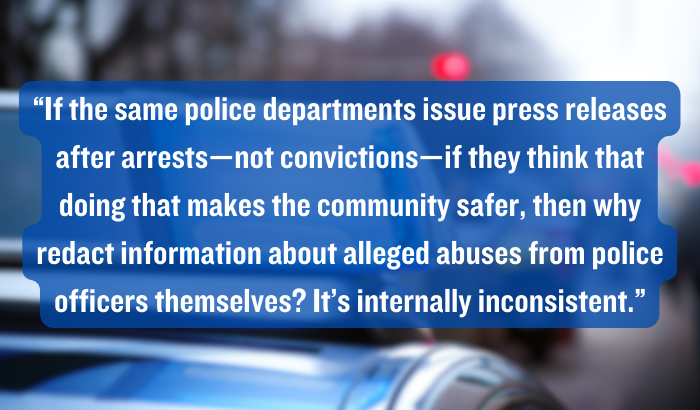“If the same police departments issue press releases after arrests—not convictions—if they think that doing that makes the community safer, then why redact information about alleged abuses from police officers themselves?”
The state’s new database of police disciplinary records lists thousands of punishments for offenses ranging from filing false timesheets to assaults and civil rights violations—but it’s still missing data on misbehavior. Advocates say the omissions show why the agency tracking police discipline needs more power, including the ability to audit the records of local departments, in order to give the public a true accounting of police activity.
As BINJ reported earlier this year, records from the state’s Civil Service Commission show how officers can face serious discipline for years while remaining on the job. And the rulings from that agency, which investigates complaints involving promotions and discipline, provide an example of the gaps in the Massachusetts Peace Officer Standards and Training Commission’s data. In one example, CSC records showed half-a-dozen instances of discipline for an officer, only one of which made the POST list. Among the infractions left off, the cop was caught patrolling in public on duty and out of uniform with a gun in an ankle holster.
In addition to incomplete records, information about discipline and actions taken by departments that appear in the POST Commission’s list is often vague, with details about the resulting criminal charges redacted. Institutional reform advocates say that while the database is an important start, the POST Commission needs to fix its errors and demand more information—potentially through audits of departments—so Mass residents can better monitor the actions of police and identify misbehavior.
“Fill in gaps instead of throwing out the baby with the bathwater,” Svante Myrick, president of People For the American Way, told BINJ. “If there are issues with the database they must improve it, but not miss the point of the bathtub—not lose sight of why you need the database in the first place.”
“Sometimes what happens is we get tools and they’re imperfect and we want to improve them, but people try to use it as solid evidence that maybe misconduct is not as widespread as we think,” Sophia L. Hall, Deputy Litigation Director for Lawyers for Civil Rights, told BINJ. Hall said. “One of the reasons it’s been so slow to create meaningful police reform is that jurisprudence and society hold police on a pedestal they don’t hold others. We really need to eliminate that way of thinking. It hinders our ability to capitalize on transparency and accountability, it’s one more thing used to cloak and shield law enforcement.”
New data, new gaps
The POST database currently includes more than 3,400 records of 2,165 officers from 273 law enforcement agencies—including campus police departments. It will be continually updated, according to the commission. It does not publish non-sustained complaints, or complaints a department has not determined to be valid. By charter, the body reports on discipline relating to bias, excessive force, truthfulness, police shootings, criminal misconduct, and other misconduct.
And the database shows various levels of disciplinary response to misconduct, from written warnings all the way to termination. Each entry lists the name of the officer and his or her department, along with the date of any alleged infraction(s), the type of infraction and details, and the discipline leveled by the department.
Such information, however, is supplied by departments themselves and can vary in granularity. In its entry for the termination of one officer, the Beverly Police Department lists specific infractions like “posing in a Hitler salute,” and “drinking on duty.” But the Leominster Police Department just describes “Truthfulness or Professional Integrity,” or presumably a lack of it, as the violation that led to another officer’s firing, with no further information.
In addition, the commission itself often redacts specifics about criminal charges, despite them often being available in other public databases.
“The Commission is obligated to redact certain information, such as Criminal Offender Record Information (CORI),” POST Commission spokesperson Alia Spring said. “We remain committed to updating the database as needed and future versions may include additional information.”
But that policy doesn’t align with how police departments operate regarding their own publication of arrest information, Myrick from People For the American Way said.
“You really have to have a unified theory of what makes positive change. … If the same police departments issue press releases after arrests—not convictions—if they think that doing that makes the community safer, then why redact information about alleged abuses from police officers themselves? It’s internally inconsistent.”
Hall said because departments are allowed to submit their own information to the agency, the POST Commission may not have disciplinary infractions in full view, if at all.
“This database is intended to keep internal affairs mechanisms honest,” Hall said. “We can’t do that if we don’t have the whole picture. We can’t do that if police departments pick and choose which information to give.”
Because the database only includes disciplinary information from departments, it does not have data from other sources. As BINJ recently reported, civil service records showed how the Quincy Police Department offered jobs to candidates with questionable backgrounds, including one person who had been arrested after driving 100 mph in a 40 mph zone and failing a sobriety test; another who had lied about using cocaine during a previous police interview; and another person whose family filed two allegations of sexual assault against them and had “clear concerns’ for [the] candidate becoming a police officer.” None of that shows up in the POST compendium.
The database also does not include past or present lawsuits against police officers, Hall said. And that can overlap with another gap accounting for an incomplete picture of police misconduct—how it doesn’t include discipline for officers who resigned in “good standing” and are no longer working.
“The gaps are still so significant, so most people I don’t believe have real meaningful insight into how local departments function and what local officers are up to,” Hall said. “That should be the aim.”

Missing a ‘very concerning’ history
The POST Commission entry for a Peabody officer shows the gulf between what’s currently reported and the disciplinary measures and questionable behavior that are still hidden from public view. The database lists the officer as charged with “Other Misconduct ‐ Failure to respond to an incident according to established procedure” on Nov. 30, 2020. “Attention to Duty” is listed under further details, and the officer was given a suspension of between one and five days.
That is the only entry for that officer in the POST Commission database—but other records show much more.
When the officer was passed over for a promotion in 2022, he appealed to the Civil Service Commission. Because police are hired through the civil service process, the CSC hears their complaints in a lengthy process that involves detailed hearings, where both officers and departments lay out their positions. The nature of the cases often involves personnel and disciplinary information about officers and other people involved in the appeal.
The CSC will ultimately issue a public ruling on the appeal. And the CSC’s determination for this officer—put out earlier this year—gave a far more complete picture of his disciplinary history than the POST Commission, detailing how superiors have been concerned about his behavior for years, with the chief of police telling the mayor the officer “should not be promoted … due to his ‘very concerning’ disciplinary history,” the ruling stated.
“The Chief believed the Appellant ‘does very well in a controlled environment but when asked to be out on his own, it becomes very concerning the decisions he makes,’” according to the ruling.
The suspension for “Failure to respond to an incident according to established procedure” is discussed in the ruling. It involves a one-day suspension, but also referred to a September car crash where the officer was patrol supervisor. According to the ruling, the driver fled the scene and later fought multiple cops—who complained “their safety was put in danger” because of the officer in question’s actions. On another occasion, he was suspended from the detail list for putting “false information on records” and claiming he worked hours he did not.
None of those actions made the POST Commission’s database. And neither did the officer’s most recent alleged misconduct. In December 2021, he admitted that he removed his uniform and put his gun in an unauthorized ankle holster while walking—while on-duty—at a local mall. He told internal affairs investigators he had mall-walked while on duty several times, and was ultimately suspended for five days without pay, according to the ruling.
The Peabody Police Department did not respond to requests about the officer’s discipline records and their submission to the POST Commission. The CSC ultimately ruled in April this year that he should not be promoted, but the officer remains certified and working in Peabody, according to the latest POST Commission posting.
The “whole picture”
A POST spokesperson said there are several reasons why the database might not have disciplinary information.
“The database contains summaries of sustained allegations and discipline imposed on active police officers as reported by Law Enforcement Agencies. As such, there may be varying levels of detail for records,” POST Commission spokesperson Alia Spring told BINJ. Adding, “It should be noted that a matter that was not forwarded to the POST Commission or was pending as of Jan. 31, 2023 or occurred after that date may not appear in the database.”
Hall said the difference between the officer’s full record and what is available on POST shows the need for full transparency—not just to show the record, but to push back on how the lack of information can lead people to conclude there are fewer issues than there really are. The agency mistakenly left off disciplinary records for entire departments, like Cambridge and Everett, and while Spring said the commission is “working to promptly resolve these issues,” Hall said opponents of police reform can use the lack of information to claim departments have fewer problems than they actually do.
“Sometimes what happens is we get tools and they’re imperfect and we want to improve them, but people use it as solid evidence that maybe misconduct is not as widespread as we think,” Hall said. “Gaps [like the Peabody officer’s record] leave people ill-informed and they run the risk of misleading people. It’s not just an absence of information, that’s problematic too, but if that implies something that’s inaccurate, that there’s no misconduct or police are in good standing, it misleads the public and creates double harm.”
“This database is intended to keep internal affairs mechanisms honest; we can’t do that if we don’t have the whole picture. We can’t do that if police departments pick and choose which information to give,” she added.
Advocates say that means the commission needs to step in and demand more access.
“You have to have the power to do audits,” Myrick said. “If the state authority doesn’t have the ability to audit or even spot check, or pick a random number of departments each year and say, Does the information you sent us match all the information you have? Without that, you’re not getting the full benefit of transparency.”
Hall agreed with Myrick that the only way to truly get that information is through audits.
“Many state agencies, once they’ve gathered a certain level of information, engage in audits. I would hope that the POST, after collecting that threshold of data, says, We need to look back and see obvious holes, who is not responding or who is responding inconsistently with what we know of behavior and size of departments.”
Hall recommended “random audits where departments have to hand over everything,” and added, “The responsibility is to ensure compliance; otherwise, POST is not an effective tool for police reform.
“The community deserves to be able to hold law enforcement accountable the same way it holds anyone accountable. They should be held to a higher standard than us.”
This article is syndicated by the MassWire news service of the Boston Institute for Nonprofit Journalism. If you want to see more reporting like this, make a contribution at givetobinj.org.





